FINAL UPDATE: Critic Finn Halligan offers reactions to Cannes 2014 Competition films as they screened.
Friday, May 23
Clouds of Sils Maria, Olivier Assayas
For the second year in a row, the final film to compete at Cannes is a deconstruction of a theatrical text - last year Polanski saw the festival out with Venus in Furs, this year it’s Olivier Assayas with The Clouds of Sils Maria, starring the ever-talented Juliette Binoche and Kristen Stewart. For good a good deal of its 123 minute running time, Sils Maria is a two-hander, and Stewart raises her game to deliver on the promise she has shown in the past - and prompt hopes for her future career.
Clouds of Sils Maria is about an older actress, Maria Enders (a fantastic performance from Binoche) who is returning, 20 years later, to the play which made her famous. Previously, she played the ingénue who drove her lesbian boss to commit suicide. Now she has to turn the mirror on herself and play the older, fading force.
Stewart, however, does not play the paparazzi-magnet ingénue - that (smalle ) role goes to Chloe Grace Moretz. Instead Stewart is Maria’s capable, youthful PA Valentine, who goes to Sils Maria in Switzerland with her employer to rehearse the part before the role goes into production. The personal and the professional blur as Maria agonises over the role and what it means to her.
The Clouds of Sils Maria is a refined, intellectual exercise, an insight into actors, the interpretation of texts, ageing, and the process of changing perspectives - Sils Maria is where the philosopher Nietsche refined his ides on eternal recurrence. It split the audience, as perhaps might be expected - perceived by some as pretentious and rambling, even as others reacted warmly indeed to the high calibre of the performances on screen.
Thursday, May 22
Leviathan, Andrey Zvyagintsev
Russian master Andrey Zvyagintsev’s Leviathan, an epic film about a lone man’s battle to defend himself and his family against the encroaching tank of the rotten Russian state, was an immediate critical favourite at the Palais Des Festivals, topping many charts - although there is not, as yet, a clear favourite for this year’s Palme D’Or, this would be a popular choice.
Leviathan is set in the Kola peninsula in Northwest Russia, not far from Finland, where mechanic Kolia (Alexey Serebryakov) lives on the riverside with his son from his first marriage and his young second wife (Elena Lyadova). Settled there for generations, he resists when the corrupt local mayor (Roman Madyanov) attempts to seize his land, enlisting the help of his Moscow layer friend (Vladimir Vdovitchekov) in a ceaseless battle for which even God has no answers. This is not a film or a place where justice is a recognisable quantity, however, and Kolia’s determination will result in terrible consequences for all.
Leviathan is a dark beauty to behold, Kolia’s riverside environs statuesque in their decay, with rotting boats and the bones of a dead whale bearing silent witness to events (the use of the prelude from Philip Glass’s opus Akhanaten is both grand and inspired). Leviathan is Zvyaginstev’s fourth feature and, even though he won at Venice for The Return, it should open up the international arthouse for the Russian director, just as his work becomes more openly critical of what is going on at home.
Jimmy’s Hall, Ken Loach
Ken Loach has, apparently, changed his mind and Jimmy’s Hall may not be his last fiction feature after all. It’s his 12th film in Competition at Cannes, which is already a record. A rather conventional trip back in time to Ireland in the 1930s to revisit a little-known tale about the only Irishman to be deported from his homeland, Jimmy’s Hall has been picked up for the US by SPC, probably as a St Patrick’s Day release – there’s lots of straight-armed dancing and fiddles and ceilidhs at the Emerald Isle’s crossroads, and the overall mood here is defiant joy amidst the sorrows.
As with many of the films in this year’s stately barge of a Competition selection, reviews were respectful of Loach himself, but not entirely hot on this film. Jimmy’s Hall isn’t a picture to dislike, but it can feel sedate and a little facile. Its targets are the church in particular and De Valera’s semi-fascist state, almost as an afterthought, who come together to force Leitrim’s one decent man, a socialist, out of Ireland.
Barry Ward takes the lead as Jimmy, ably backed up by Jim Norton as the vengeful local cleric who names and shames the young people who dance at Jimmy’s Hall from the pulpit. Contrast Jimmy’s Hall, though, with the savage irony of Calvary, John Michael McDonagh’s look at the church in Ireland, also made this year, and Loach’s film feels dated, out-of-step, at a safe emotional distance to its subject matter.
Screen’s review here.
Goodbye TO LANGUAGE, JEAN LUC-GODARD
Jean-Luc Godard’s 70-minute Goodbye To Language, shot in 3D, was a perplexing, chatty art installation that may ultimately prove to be simply just Godard having fun – but it will take many viewings before a consensus is reached. Unlikely to trouble the multiplex with its presence, Goodbye To Language has a lot going on – which may ultimately turn out to be very little, nobody seemed to be sure.
The film’s 3D element is confrontational, as Godard sends different images to each eye in a painful juxtaposition – it’s visually bruising. Words and sound collide, there are repetitions and super-impositions, jarring bursts of music and narration of philosophy texts. Schoenberg, a man on the toilet with accompanying sound effects, a lithe naked woman. And a dog, although nobody uses the words shaggy or story together with it.
Jean-Luc Godard is 83 now and, although he didn’t attend the festival, there’s not much sign of a creative slow-down – he contributed an episode to the portmanteau The Bridges of Sarajevo, which is one of the last films in Official Selection here. More installments can perhaps be expected, which, you never know, may clarify Goodbye To Language. Or not. Either way, the critics were quick to move on.
Screen’s review here.
Mommy, Xavier Dolan
Xavier Dolan is the youngest director to compete at Cannes this year, and blew the cobwebs out of the Palais Des Festivals with his exhilarating Mommy. Dolan is still only 25 years-old, yet Mommy is already the Canadian director’s fifth feature and easily his best work. Dolan is at an apex where he still dares to be different – shooting Mommy in a unique aspect ratio of 1:1, for example – but has also gained the maturity to realise his grand ambitions. Of course, the critics weren’t united in their praise of Dolan, some still nursing wounds from the misfire that was Tom At The Farm last year: he’s far too brash to pull that off. When the reviews started to trickle out, however, the general consensus was: brilliant.
The Competition had been looking a little staid and polite before Dolan blew into town with his touching Quebec-set drama, thematically a follow-on from his Camera D’Or-winning first feature I Killed My Mother. Dolan himself doesn’t feature onscreen this time, however, and that distance seems to have enabled him to achieve three mesmerising performances from his leads in this story of an overwhelming maternal love, in particular from Anne Dorval again.
Dorval is Diana, “Die”, Despres, the tough and often inappropriate mother of 15-year-old Steve (Antoine Olivier Pilon), who has ADHD, dissociative disorder and is released back into Diana’s care when he sets fire to the home where he is being treated. He is a beautiful, foul-mouthed angel of boy, appealing in one minute, appalling the next. The mother and son have an crazy, rollercoaster dynamic, and an extraordinary energy – for good and bad - which attracts their repressed neighbor across the street (Suzanne Clement from Laurence Anyways).
Overshadowing their story is the fact that Mommy is set in a future Canada, when parents are enabled to commit their children to psychiatric hospitals if they can no longer cope. has a realistic shot at the Palme D’Or and at the very least, Marion Cotillard has some strong rivals from all three leads, with a team Palme not be out of the question. But that’s at the very least.
Screen’s review here.
Wednesday, May 21
THE SEARCH, Michel Hazanavicius
Tuesday, May 20
TWO DAYS, ONE NIGHT, Jean-Pierre and Luc Dardenne
Cannes film critics just love, love, love Marion Cotillard in the Dardenne Brothers’ latest feature, Two Days, One Night. It could, they agree, be her best-ever performance. True, many acknowledge, she doesn’t ever feel like a genuine Belgian solar panel factory worker (did she work in the front office?), but she’s so good in this taut drama that it doesn’t really matter.
More conventionally structured than the Dardennes’ norm, Two Days, One Night is a modern rendition of 12 Angry Men. It’s a departure for the Dardennes, winners in Cannes so many times before (two Palme d’Or for Rosetta and L’Enfant, on top of many prizes here for acting, screenplay, and the Grand Prix for their last film to compete, The Kid With A Bike).
Endlessly inventive, they have cast Cotillard outside their usual team of players to embody Sandra, the desperate mother of two small children who has just recovered from a nervous breakdown. She has also been made redundant at work after the boss offered her colleagues a dark choice: Sandra, or a Euros1,000 annual bonus. They went for the bonus.
Believing her co-workers to have been intimidated by the heartless foreman, who realises that the work can be done without Sandra, she begs for a secret ballot. She gets her wish, and, pushed – too far? - by her supportive husband, Sandra now has the weekend to convince the 16 factory workers to change their minds. Alternating between depression, panic and tears, with her Xanax ever close to hand, she starts to visit them at their homes.
While the Dardennes have won, as mentioned, many prizes here, Marion Cotillard has not. It was a good day for Marion on the Croisette: the critics also loved her dress. Could she stretch it into a great week?
Screen’s review here.
STILL THE WATER, Naomi Kawase
True to form, Naomi Kawase was in a contemplative mood for Still The Water, a beautiful-looking film set on a subtropical Japanese island (it was shot by Kore-eda’s regular cinematographer Yutaka Yamazaki). Preoccupied as ever with Japan’s traditional past and the changing of the generations, Kawase this time takes a close look at death, in particular the passing of a young girl’s mother. (Although the film also opens with the discovery of a body in the sea, it’s not a morbid film - in fact it seems particularly alive throughout).
Typhoons lash the island at the beginning and the end and give Still The Water a restless energy, even in static shots, as two young teenagers fall in love and learn about how to be truly alive. The narrative ebbs and flows, and includes a glowingly-shot trip to Tokyo, which grapples in contrasting ways with the same issues.
Critics, as ever, were divided by Kawase, who, prior to Cannes, said she believed this film to be her masterpiece - it was inspired by the death of her foster mother. Two goats are killed and bleed gurglingly to death during Still The Water, one sliced with a razor, and that was at least one dead goat too many for some in the room. Others were more impressed, some greatly, and the reception from Japanese viewers was warm.
At the very least, Still The Water should benefit from its Cannes Competition berth to be a strong festival performer for MK2. And awards remain anyone’s guess at this point in the Competition, of course.
Screen’s review here.
Monday, May 19
Foxcatcher, Bennett Miller
Channing Tatum and Steve Carrell are revelations in Bennett Miller’s compelling character study Foxcatcher, one of the strongest films in the Cannes Competition to date. They play the Olympic wrestler Mark Schultz and the eccentric billionaire John du Pont, the richest person in America at the time this film is set (1987-1996). Their intense characterisations - Tatum as a hulking, internalised wrestler and Carrell practically unrecognisable as his chilly, conflicted mentor and sometime father figure - are enabled by a warm performance from Mark Ruffalo as Schulz’s brother David. All three actors should figure in awards season praise, and Foxcatcher could be career-changing for each one.
Miller’s story starts when Mark Schultz, already an Olympic gold medal-winning wrestler (Los Angeles, 1984) is approached by the mysterious billionaire Du Pont and asked to come and train on a purpose-built gym which has been built on the family’s lavish Foxcatcher ranch. Mark, who trains with his brother David (also an Olympic champion) and lives in his loving shadow, wants them both to go, but David refuses to move his family. What transpires over the next 134 minutes is a complicated story of masculinity, love, control and the search for approval.
Response to Miller’s film, which was produced by Megan Ellison, was immediately warm, and Foxcatcher moved up the charts to rank as a Competition favourite along with Mr Turner and Timbuktu. Its complex layering of detail and studied character observation take Miller a step forward even from the closely observed excellence of Moneyball and Capote. Strong writing, from E. Max Frye and Dan Futterman is technically reinforced by some lovely design from Jess Gonchor, in particular in the wrestling gyms and the du Pont mansion, and that should certainly be noticed in awards season as well.
Channing Tatum and the Cannes Best Actor prize? Not as impossible as you might have thought yesterday.
Screen’s review here.
Sunday, May 18
Maps To The Stars, David Cronenberg
A cool-eyed satire on Hollywood morals which sees David Cronenberg return to some of the themes which haunted his earlier films, Maps To The Stars marries Altman’s The Player with Cronenberg’s own Crash, throws in a little Mulholland Drive, and shakes it up and down til it fizzes. With a delicious central performance from Julianne Moore having a great deal of fun as a faded, jealous actress and an array of fine support (including Robert Pattinson, Mia Wasikowska, John Cusack and Olivia Williams), Maps to the Stars is an enjoyably weird ride through the sharper edges of Tinseltown from Canadian craftsman David Cronenberg, even if it feels more conventional in its strangeness than some of his more radical films.
Maps to the Stars was generally liked by the critics, if not passionately adored. The main question point of concern was whether general audiences would relate to Cronenberg’s insider jokes about the incestuousness of show business? (Limo driver and aspiring actor Robert Pattinson considers becoming a Scientologist to advance his career). They didn’t do The Player any harm two decades ago, though, and Cronenberg, shooting for the first time in Los Angeles, has made a greater connection with Maps to the Stars than with his last Cannes Competition film, Cosmopolis.
Screen’s review here.
The Homesman, Tommy Lee Jones
Tommy Lee Jones came to compete in Cannes for the second time with The Homesman, in which he stars opposite Hilary Swank. A Western, like his debut The Three Burials of Melquiades Estrada (and the third Western to play in Cannes thus far), The Homesman takes a good hard look at what life must have been like for women on the frontier.
Three in the town of Loup have broken down in the face of deprivation, abuse and despair, and, flinty spinster Mary Bee Cuddy (Hilary Swank) is charged by her church with delivering them home to their families back East in a hazardous cross-country trek. She enlists local outlaw Briggs (Tommy Lee Jones) to help her through Frontier territory, and comes to rely on the claim jumper’s support.
The Homesman played to a warm audience of critics, its prospects for art-house play immediately deemed good. Parallels to The African Queen were drawn. There were some dissenting voices, particularly from European critics looking for something a little more sophisticated than what was, at times, a home-spun yarn (the mental illnesses on display lacked a degree subtlety). Co-starring Hailie Steinfeld, Meryl Streep, Meryl’s daughter Grace Gummer, Miranda Otto, John Lithgow and James Spader (who delivers a wincing Irish accent), The Homesman isn’t a revisionist piece but more of an exploration of the West’s untold stories. It may play well to a majority-female Jury.
It must be noted, however, that the critics are in a benign mood at Cannes this year: almost half-way through the Competition, few have fallen truly foul of the normally-rowdy Palais press screening room.
At least, thus far…
Screen’s review here.
SATURDAY, MAY 17
The Wonders, Alice Rohrwacher
Warm words flew in the direction of Italian director Alice Rohrwacher’s The Wonders, a fragile story about a family of beekeepers in Italy who are struggling to maintain their hold on the land. Rohrwacher has opted to follow her 2011 debut, Corpo Celeste (which showed in Directors’ Fortnight), with another coming-of-age story about an adolescent girl, played delightfully by newcomer Alexandra Lungu. But while the critics were universally receptive, there seemed to be a consensus that this slight and delightful tale lacks the heft to be a serious awards contender.
Apparently based in part on Rohrwacher’s own family history, The Wonders is centred around radical parents who have dropped out to farm the land - the father, from Germany, is played by Sam Louvyck, while the mother is Rohrwacher’s sister Alba. Teenage Gelsomina (Lungu) has three younger siblings and has stepped up to help her father run the beekeeping business in the absence of a son.
Things change, however, when a TV competition to find “Village Wonders” comes to town looking for local produce. The show is fronted by Monica Belucci, who manages ethereal artifice as the mysteriously bewigged Milly Catena. Meanwhile, to make money, Gelsomina’s father takes in a juvenile delinquent from Germany as part of a rehabilitation programme.
Intimately observed and shot in a naturalistic, almost documentary style, The Wonders is a gentle arthouse pleasure.
Screen’s review here.
Saint Laurent, Bertrand Bonello
Yves Saint Laurent’s life story is quite a la mode in 2014, and Bertrand Bonello’s biopic is the second off the block within the space of five months. Certainly, between the two, no fly has been left unzipped in the poignant story of the Algerian-born design genius who lost his fragile mind in the 1970s era of drugs and promiscuous sex which he helped to clothe so glamorously.
At 151 mins, Bonello’s Saint Laurent (going out in the US through Sony Pictures Classics) is longer and glossier than TWC’s Yves Saint Laurent (which was authorised by the designer’s business partner Pierre Berge.) But it flounces over precisely the same catwalk, to the point where both omit the designer’s childhood and formative years including a stint in a mental asylum during his military service. Bonello even drops Saint Laurent’s years at Dior to focus on rough sex, drugs and inadvertent dog-killing, as might be expected from the man behind House of Pleasures.
Bookended by flashback and flashforward sequences, Saint Laurent felt repetitive in its long mid-section, swirling around clubs and champagne and Loulou de la Falaise (Lea Seydoux, completely under-used) and Betty Catroux (Aymeline Valade), sex with rough trade, pills, and, just to remind us, the designer’s office where he swigged whisky for inspiration. Despite the astonishing costumes and another riveting, mostly internatlised performance in the lead role (Gaspard Ulliel) the critics found it a all little last season.
Pierre Berge (played by Jeremie Renier) kept a tight lid on Saint Laurent throughout his career, and the result is that Yves was, is, and two films later will probably always be, an enigma dressed in a smoking suit.
Screen’s review here.
FRIDAY, MAY 16
Wild Tales, Damian Szifron
It’s rare that a film’s pre-title sequence gets a full round of applause at a critic’s screening in Cannes, but Damian Szifron can bask in the warm glow of knowing that three of the six short films which make up Wild Tales, his Competition debut, were loudly clapped. Sacre Coeur!
Szifron’s driving, innovative comedy became cumulatively darker, and the applause more muted, as he struggled to maintain the sheer brilliance of the film’s first hour. But reaction was very positive overall for the Argentine film-maker, reinforcing SPC’s decision to pick up Wild Tales for North America earlier in the festival.
Szifron’s stories are, he explains, about people, who lose control, or explode. They include Ricardo Darin, as an explosives engineer who takes revenge against the traffic enforcement police, Erica Rivas as a epically disappointed bride, and Leonardo Sbaraglia as an aggressive driver (perhaps the film’s highlight - although the airplane-set pre-credit sequence Pasternak takes some beating).
Cannes doesn’t always programme comedies in Competition and festival chief Thierry Fremaux had been careful to highlight Szifron’s film in the festival’s press conference, giving it a prime Saturday slot and thus drawing attention to this unusual film. The market should follow suit.
Screen’s review here.
Winter Sleep, Nuri Bilge Ceylan
There was only one showing at Cannes for Nuri Bilge Ceylan’s chattily philosophical 3hr 16min drama Winter Sleep, a mix of press and premiere. Reaction was standing-ovation favourable, as is de rigeur for an official screening with the director in attendance. Outside the room there was praise as well - from those who managed to get in - although it felt qualified.
Unlikely to win Turkey’s premier film-maker many new fans (although it should certainly hold his devoted audience’s attention), Winter Sleep frequently feels like a rich Chekhov stageplay, and the dialogue is intense. This is a very heavily subtitled film - although the need to read keeps the viewer focused during moments of narrative downtime.
Winter Sleep is focused on the self-obsessed Aydin (Haluk Bilginer), a wealthy landowner and former actor who runs a hotel in the troglodyte region of central Anatolia with his much younger wife Nihal (Melisa Sozen). Aydin isn’t a sympathetic protagonist, but he is a fully realised one, and his philosophical debates with his sister and wife have an undeniable rhythm, even as his hypocritical relationship with the local Iman give the film its limited narrative thrust.
Winter Sleep looks gorgeous, both exteriors and the rich interior world Aydin inhabits. Elegant images are again courtesy of Ceylan’s regular, award-winning collaborator Gokhan Turyaki.
Screen’s review here.
The Captive, Atom Egoyan
The first catcalls rang through the Lumiere theatre as critics professed themselves less than impressed with Atom Egoyan’s somewhat thinly sketched child-abduction drama The Captive - an awkwardly-shot and choppily-edited Canadian curio starring Ryan Reynolds as the father of a 9-year-old girl who is abducted from the back of his pick-up-truck. Eight years later and at odds with his wife (Mireille Enos), he refuses to give up the search.
Thematically, The Captive harks back to Egoyan’s Jury Prize-winner at Cannes- his adaptation of The Sweet Hereafter, which also dealt with a small snowbound Canadian community coping with the after-math of a tragic accident in which children were lost. Egoyan wrote The Captive himself, and the film doesn’t seem able to stand itself up through an ambitious flashback structure. Not helping matters is the fact that the town’s child protection unit, led by Rosario Dawson, is inept to the point where they derail Egoyan’s plot.
Provoking unfavourable comparisons with the tough drama Michael, which Markus Schleinzer premiered here in 2011, The Captive has sold well internationally and may attract audiences curious about the theme - although Egoyan’s Toronto 2013 misfire Devil’s Knot failed to make an impression despite the combined starpower of Reese Witherspoon and Colin Firth. Cannes remains a loyal friend.
Screen’s Review here.
THURSDAY, MAY 15
Mr. Turner, Mike Leigh
Mike Leigh’s Mr. Turner basked in the warm glow of rapturous reviews - from UK critics in particular, although the lowest score on the Screen Cannes Competition Critics’ Jury was a benevolent three. Sated after the Grace of Monaco feeding frenzy and seduced by the brilliant painterly lensing of DoP Dick Pope, reviewers warmed to Leigh’s leisurely look at the life of JMW Turner, played brilliantly by Timothy Spall.
A biopic which screams pedigree British art-house film-making, Mr .Turner is more gently episodic than dramatic, the detailed moments in Turner’s life adding up to a pure portrait of the fabled painter. With a very large supporting cast (including Leigh regulars Ruth Sheen and Lesley Manville) working in gorgeously observed surroundings (the early-1800s production design is brilliantly imagined by Suzie Davies), this film is a natural fit for the Topsy Turvy crowd that gave Leigh his most successful film to date.
Mr Turner’s dialogue, however, can be hard on the ear in the first third of the film - although Spall’s dialogue shrinks by the mid-part to an eloquent series of mostly grunts and nods.
Screen’s review here.
Interview with Mike Leigh here.
WEDNESDAY, MAY 14
Timbuktu, Abderrahmane Sissako
Timbuktu made a bold statement of intent for Cannes 2014 as the official Competition got underway. Immediately admired, this contemporary African drama set in repressive Islamic northern Mali has themes which strike a nerve right now, but Abderrahmane Sissako’s drama is very much its own statement, stylistically and geographically.
Sissako (Bamako) sets his film to the intrinsic rhythms of Timbuktu, where foreign occupants - the self-styled Islamic police - have imposed their jihad on a town and its daughters. The film is pleasingly unpredictable - there’s a football game with an imaginary ball, a cow called GPS, and a jihadist who seems to dance a lament.
This is all part of a fear made incarnate with the lashing of a young girl (she sings through the whipping) and the stoning deaths of a couple (a real-life event which inspired the feature and effectively anchors Sissako’s drama). The director’s main concern lies outside the town, however, in the desert where the nomadic Kidane and family try to lead a natural life.
With a warm initial critical reception, Timbuktu is destined for international arthouse play and seems an early awards candidate.
Screen’s review here.
Grace of Monaco, Olivier Dahan
Cannes opening film (out of Competition) Grace of Monaco proved provocatively low-hanging fruit for Cannes critics.
“Puts the grim back in Grimaldi,” said The Times (of London), memorably, while excoriating one-star reviews followed suit across the UK, in particular The Guardian and The Telegraph.
They made for far more entertaining reading than the film itself, a schmaltzy rendition of a rather dull tale set in 1961-2 Monaco and involving, at various times, Grace Kelly (Nicole Kidman), Alfred Hitchcock, Charles de Gaulle, Aristotle Onassis and Maria Callas (Paz Vega).
US critics, when they weighed in, may have been slightly softer overall in tone but were in no mood to rescue Olivier Dahan’s damsel from distress. The Diana vs. Grace debate hotted up.
With the real Princess of Monaco - Stephanie - signalling her displeasure (sight unseen) earlier in the week, Grace of Monaco suddenly seemed parlously short of pals. TWC’s Harvey Weinstein and director Olivier Dahan announced that this was the “one true” Grace of Monaco that would be released worldwide (a great deal of Europe is opening immediately), taking some of the sting out of a very poorly-reviewed film, even by Cannes opening standards.
There were a few, lonely, dissenting voices, and a general positive consensus regarding costumes and hair. Grace of Monaco may eventually even enjoy a contrarian backlash. But the film was slow-moving target practice for the critical throng as it made its way to the Palais de Festivals to open the 67th Cannes Film Festival.
Screen’s review here.
Interview with producer Pierre-Ange Le Pogam here.





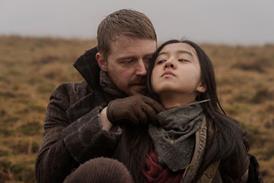

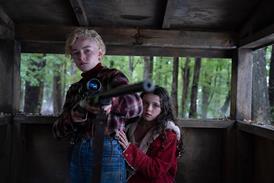
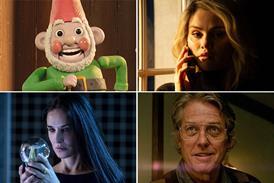



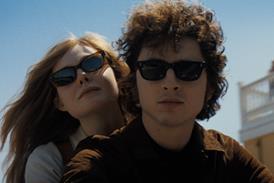
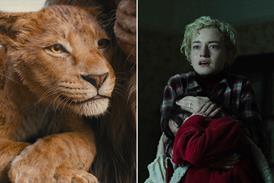

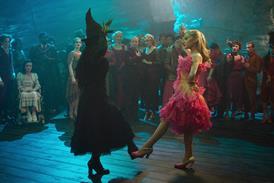
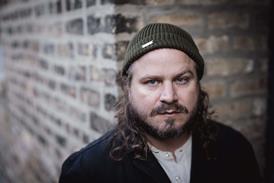







No comments yet